Can chickens eat cucumber? Yes, they can. Cucumbers are a safe and nutritious treat for chickens, providing them with essential vitamins, minerals, fiber, and moisture. In addition, cucumbers are a great source of vitamin C, riboflavin, and other essential nutrients.
They can also help keep chickens hydrated in summer, as cucumbers are 95% water. However, cucumbers should only be given to chickens in moderation, as large quantities can cause digestive upset and problems like diarrhea. When feeding cucumbers to chickens, it is important to ensure they are cut into small, bite-sized pieces. This will help prevent choking and make it easier for chickens to digest.
This article will cover the nutritional benefits of feeding cucumbers to chickens, how to safely feed them, and some other tips for adding cucumbers to a chicken’s diet.
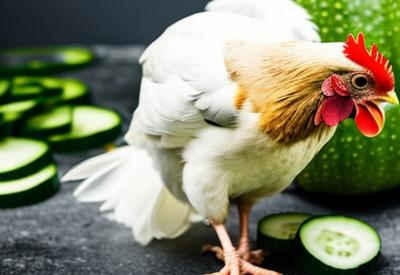
Can chickens eat cucumber?
The good news is that it is safe for chickens to eat cucumbers. Cucumbers can provide many beneficial nutrients like Vitamin K, Vitamin B6, Vitamin C, Magnesium, Potassium, and Fiber. Not only that, but cucumbers are composed mostly of water which can help keep your chickens hydrated in hot weather.
But even though cucumbers are safe for chickens to eat, they should only be an occasional treat. If you decide to feed your chickens cucumbers as a treat, there are a few things you should keep in mind. First off, remember that while it may be tempting to give them the whole cucumber right away, it’s best if you cut it into smaller pieces first, so your hens don’t have difficulty eating them.
Secondly, be aware that not all chickens will eat cucumbers immediately. To get them used to the taste, try mixing chunks of cucumber with their regular food or offer it by itself and see if they take to it over time.
[ChickenAffiliate]
The benefits of eating cucumber for chickens
Cucumbers are a great addition to your chicken’s diet. Not only is it an affordable, healthy snack for your chickens, but it also has several benefits that can improve your feathered friends’ overall health and well-being. Let’s take a closer look at five reasons why you should consider adding cucumbers to your chicken’s diet.
Hydration
Cucumbers are made up of over 95% water, making them an excellent source of hydration for your chickens. This is especially important during the summer when temperatures can become quite high, and humidity levels rise.
A few slices of cucumber in their feed will help keep them cool and hydrated throughout the day.
Digestive Health
Cucumbers are also rich in dietary fiber, which helps to promote good digestive health in chickens. Fiber helps keep the digestive tract running smoothly and prevents constipation or other digestive issues from developing.
It also helps ensure that the body properly absorbs all nutrients from its food.
Vitamins & Minerals
Cucumbers contain various vitamins and minerals that can benefit chickens, such as vitamin E, potassium, magnesium, zinc, and iron, to name a few.
These essential vitamins and minerals help support a healthy immune system, bone growth, and muscle development.
Low Calories
While cucumbers provide numerous nutritional benefits for chickens, they are also low in calories, making them an ideal snack if you’re trying to manage your chicken’s weight.
Natural Pesticide
Finally, cucumbers can naturally repel certain pests like fleas and ticks due to their high water content and certain compounds found in their skin, such as limonene which is known to have insect-repellent properties.
So not only will they provide nutrition for your feathered friends, but they may also ward off pesky pests!
Things to watch out for when feeding cucumber to chickens
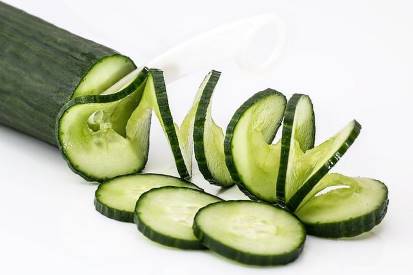
Cucumbers are one of the few vegetables that chickens enjoy eating. However, there are a few things you need to keep in mind when feeding cucumbers to your chickens. Before adding cucumber to your flock’s diet, here are three key points to consider.
Feed in Moderation
Chickens love their treats, but it’s important to remember that too much of a good thing can be detrimental. While cucumbers are an excellent source of water and vitamins, just like any other food, they should be given in moderation.
If you feed too many cucumbers, it could throw off the balance of their diets and lead to nutritional deficiencies. As with any other food, it’s best to add cucumber as a treat only once or twice weekly.
Watch for Pesticides
If you grow your own cucumbers, ensure you’re not using pesticides on them. Pesticides can be very harmful to chickens and cause serious health issues if ingested, so this is important to keep in mind when feeding them anything from your garden.
If you buy store-bought cucumbers, make sure they are grown organically.
High Water Content
When giving your chickens cucumbers, it’s important to remember that they contain quite a bit of water. This means that while they may think they’re getting more food than usual due to the large volume of the vegetable, they aren’t getting much more nutrition because most of the weight comes from water.
This is why it’s important not to overfeed them cucumbers – they won’t get enough nutrition from them otherwise.
How often should chickens eat cucumber?
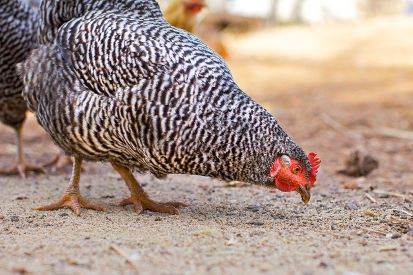
Feeding your chickens cucumbers is a great way to reward them with a delicious and healthy snack. Cucumbers are packed with vitamins, minerals, and dietary fiber; however, it’s important to limit how often they eat cucumber as it should only make up no more than 10% of their total diet.
Your flock will benefit from having an occasional treat, but this shouldn’t be something they have every day. Your chickens are sure to stay happy and healthy with the proper feeding habits.
How to prepare cucumber for feeding to chickens
To ensure that your chickens get the most nutritional benefit from cucumber, it’s important to prepare it properly before feeding it to them. Here’s how you can ensure your chickens get the best possible cucumber meal.
Wash First
Before you start cutting up the cucumber for your chickens, it’s important to give it a good wash. This will help remove any dirt or bacteria that may be present on the cucumber’s skin. It also helps soften the skin and makes it easier for your chickens to digest.
Chop into Small Pieces
Once you’ve washed the cucumber, chop it into small pieces before feeding it to your chickens. Smaller pieces are easier for your chickens to eat and digest and help them get more vitamins and minerals from each piece of cucumber they munch on.
No Need to Peel
Contrary to popular belief, there is no need to peel off the skin of a cucumber before feeding it to your chickens. The skin is very nutritious and full of fiber – something that all chickens need in their diets.
Remove Uneaten Pieces
Finally, remove any uneaten pieces of cucumber after feeding them. This can help prevent pests and bacteria from building up in their coop or run area over time. If left unattended for too long, uneaten pieces can rot and attract other unwanted visitors like rats or mice.
Can baby chickens eat cucumber?
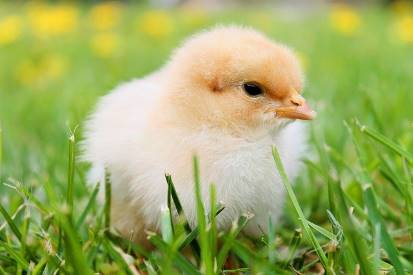
Did you know that baby chickens can eat cucumbers? It is safe for them to do so with a few caveats. Firstly, because of their delicate digestive systems, it is important not to feed baby chicks as much cucumber as an adult bird would get.
Additionally, be sure to be mindful of the water content of the cucumber, as too much can give them loose stools or diarrhea. So if you are looking for a treat for your chicks that is both nutritious and tasty – look no further than cucumbers.
Can chickens eat cucumber peels?
Cucumber peels are safe for chickens to eat as long as they don’t contain any harmful pesticides. However, it’s important to be mindful of how and where you get your cucumbers, as they could have been sprayed with agricultural chemicals.
Be sure to wash them thoroughly with cold running water before feeding the peels to your chooks. Even better, opt for organically sourced vegetables when available so you can be sure what your birds are eating is safe.
Can chickens eat cucumber leaves?
Chickens can eat cucumber leaves, though owners must be aware of pesticide residue. Cucumber plants require a fair amount of care and protection, so it is important to look for signs of pesticides and ensure the plant has been grown organically before feeding the leaves to chickens.
Chickens may not enjoy the texture as much as other greens due to the slippery texture, but they should still receive nutritional benefits. It is best to supervise chickens while consuming cucumber leaves and remove any that appear overly wilted or browning.
Can chickens eat cucumber seeds?
Cucumbers are a great treat for chickens, and the good news is that the seeds are safe for them too, and there’s no need to remove them. Chickens can eat cucumber seeds as is or with other veggies.
In addition, cucumber seeds are known to have anti-inflammatory properties, aiding the bird’s digestion and respiratory systems. Finally, feeding cucumbers with the seeds still attached can encourage natural foraging behaviors in chickens, making it a playful and fun experience.
What other vegetables can chickens eat?
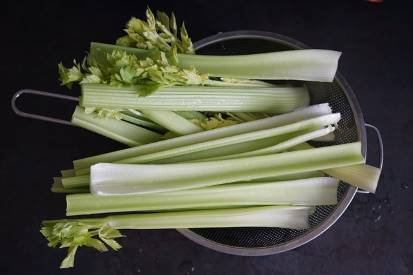
When considering what to feed chickens, most people think of chicken feed, grains, and cucumbers. But did you know there are many other vegetables that chickens can safely eat and enjoy? If you’re looking for alternative vegetables for your chickens, read on to learn about some of the best options.
Tomatoes
If you have a vegetable garden, tomatoes might be an obvious choice. Chickens will love snacking on ripe tomatoes, either whole or cut into smaller pieces. However, feed only ripe tomatoes, as green ones have toxic compounds that can harm your birds.
It’s important to watch out for tomato plants that have been treated with chemicals. Only give your chickens organic tomatoes or those grown in your own garden.
Read More: Can Chickens Eat Tomatoes? 5 Essential Things To Know
Celery
Celery is another great option for chickens. It is low in calories and provides lots of vitamins and minerals, including vitamin A, folate, vitamin K, and potassium.
Make sure to cut celery into small pieces before feeding it to your chickens so they can easily digest it.
Read More: Can Chickens Eat Celery? 5 Fantastic Benefits
Bell Peppers
Bell peppers come in various colors, including green, red, yellow, and orange. These colors are safe for chickens to eat, but they should always be given in moderation as part of a balanced diet.
Bell peppers contain lots of vitamins A and C and iron and folate, making a nutritious snack for your feathered friends.
Read More: Can Chickens Eat Bell Peppers? 4 Important Benefits
Radishes
Radishes provide plenty of vitamins A and C and calcium, which helps keep bones healthy. They also contain fiber which helps keep the digestive system running smoothly in chickens.
Make sure to give them radishes in moderation since they are high in sugar.
Read More: Can Chickens Eat Radishes? 6 Awesome Benefits
Beets
Beets are high in antioxidants which support overall health and wellness. They also provide plenty of vitamins B6 and C and potassium, which helps regulate blood pressure levels throughout the body.
Chickens will love snacking on these sweet roots when given them as treats now and then, so don’t forget to add beets to their diet occasionally.
Read More: Can Chickens Eat Beets? 5 Excellent Benefits
Can chickens eat cucumber – final thoughts
With proper care and nutrition, your backyard flock can live long, healthy lives full of clucking and crowing. If you’ve been wondering if chickens can safely eat cucumber, the answer is yes – as long as it’s served in moderation – so feel free to give your hens this refreshing summertime snack.
Finally, remember not to go overboard on the amount of cucumber you feed your hens; too much can result in loose stools or diarrhea, so stick with small portions as a treat now and then.
You can ensure that your flock stays healthy while enjoying the occasional delicious treat with just a few simple steps.
